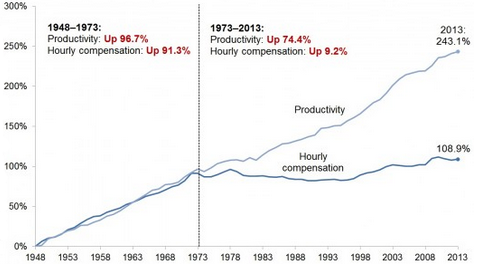csuguy
Well-known member
Greed: excessive or rapacious desire, especially for wealth or possessions (dictionary.com)
This topic often comes up when I start discussing socialism versus capitalism. In our culture, they have attempted to ingrain the idea that capitalism is godly, and socialism is evil - and even that Greed is good. Even good Christians I know try to defend Capitalism and greed as beneficial for society; and I find this boils down to a divide on what 'greed' is.
As the definition above says, greed is an "excessive desire." But what makes a desire excessive? For some, this is anything that you don't strictly need. Any self-satisfying desire that goes beyond your necessities is greed. I'm not convinced by this myself, but it is a position that some have taken.
For others, an excessive desire is when you want as much of something as you can possibly get even when you no longer have a use for it. If you continually strive after money when you are the richest person in the world, what is the point? Will it really enrich your life in anyway?
This position is a little better, but I think still insufficient. This supposes that one can only be greedy if one has acquired an abundance of whatever it is they desire - and then continues to want more. Thus, under this understanding, a poor person - or a person who lacked the object of their desire - could never be greedy. I very much disagree - and instead defend the next position.
My view of Greed is that you are taking something - money, power, etc - and placing too much importance on it. You have done this to the extent that you have displaced other matters of importance in favor of this desire. This is why scripture says that greed is idolatry - you have displaced the love of God and your fellow man with the love of money. The result being that you act accordingly - choosing gain over the well-being of your fellowman. Capitalism has supplied no end of examples of this - and this is why it makes no sense for Christians to endorse such a system.
Under this view - even a poor person can be greedy - if they place so much importance on it that they are willing to harm their fellowman to acquire it.
What do you think about Greed and Capitalism? Which of the three views do you subscribe to on greed, or do you have an alternative? Is my view on Greed unfair with respects to Capitalism? If you accept that greed is bad, and still think socialism in principle is 'evil', why?
1 Timothy 6:10 For the love of money is a root of all [g]sorts of evil, and some by longing for it have wandered away from the faith and pierced themselves with many griefs.
Colossians 3:5
Put to death, therefore, whatever belongs to your earthly nature: sexual immorality, impurity, lust, evil desires and greed, which is idolatry.
Colossians 3:5
Put to death, therefore, whatever belongs to your earthly nature: sexual immorality, impurity, lust, evil desires and greed, which is idolatry.
This topic often comes up when I start discussing socialism versus capitalism. In our culture, they have attempted to ingrain the idea that capitalism is godly, and socialism is evil - and even that Greed is good. Even good Christians I know try to defend Capitalism and greed as beneficial for society; and I find this boils down to a divide on what 'greed' is.
As the definition above says, greed is an "excessive desire." But what makes a desire excessive? For some, this is anything that you don't strictly need. Any self-satisfying desire that goes beyond your necessities is greed. I'm not convinced by this myself, but it is a position that some have taken.
For others, an excessive desire is when you want as much of something as you can possibly get even when you no longer have a use for it. If you continually strive after money when you are the richest person in the world, what is the point? Will it really enrich your life in anyway?
This position is a little better, but I think still insufficient. This supposes that one can only be greedy if one has acquired an abundance of whatever it is they desire - and then continues to want more. Thus, under this understanding, a poor person - or a person who lacked the object of their desire - could never be greedy. I very much disagree - and instead defend the next position.
My view of Greed is that you are taking something - money, power, etc - and placing too much importance on it. You have done this to the extent that you have displaced other matters of importance in favor of this desire. This is why scripture says that greed is idolatry - you have displaced the love of God and your fellow man with the love of money. The result being that you act accordingly - choosing gain over the well-being of your fellowman. Capitalism has supplied no end of examples of this - and this is why it makes no sense for Christians to endorse such a system.
Under this view - even a poor person can be greedy - if they place so much importance on it that they are willing to harm their fellowman to acquire it.
What do you think about Greed and Capitalism? Which of the three views do you subscribe to on greed, or do you have an alternative? Is my view on Greed unfair with respects to Capitalism? If you accept that greed is bad, and still think socialism in principle is 'evil', why?

.jpg)
